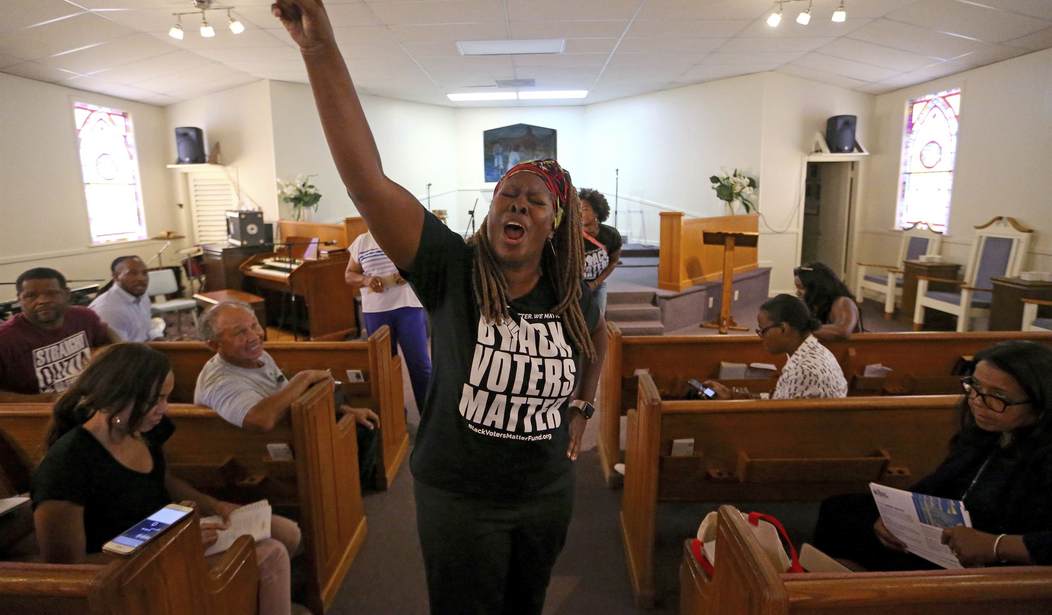We’ve heard a lot about Democrats’ concern that Latino voters (or as they call them, Latinx voters) may be drifting away from the Democratic Party. There was an NBC News story a few days ago that really put this in perspective:
Florida Democrats are fretting over Republican Gov. Ron DeSantis’ popularity among Latinos, saying they are boosting his chances of becoming the first Republican governor in 20 years to win traditionally blue Miami-Dade County and therefore propelling his chances of a successful presidential run in 2024.
Miami-Dade, the state’s most populous county, is 70% Hispanic. The last time a Republican governor won Miami-Dade County was Jeb Bush in 2002. Unlike DeSantis, Bush held press conferences in fluent Spanish and his wife is Mexican-born.
DeSantis is an “outlier” among Republican governors, said Fernand Amandi, a Democratic consultant and pollster in Miami.
But it’s not just DeSantis and it’s not just Florida that has Democrats worried. Today Politico published a story titled “Democrats growing anxious — again — over Black turnout.”
Black voters form the backbone of the Democratic electorate, voting for Democrats at higher rates than any other racial group. But interviews with more than a dozen elected officials, strategists and activists in key swing states, most of them Black, suggest Democrats are increasingly concerned that Black turnout could sag this November — and with it, Democrats’ electoral chances.
If Black turnout were to fall this year, it would seriously complicate — if not eviscerate — Democrats’ path to victory in hotly contested gubernatorial and Senate races across the country, including Georgia, Pennsylvania, North Carolina, Michigan and Wisconsin. In a poll by POLITICO-Morning Consult released last week, just 25 percent of Black registered voters described themselves as “extremely enthusiastic” about voting in this election, compared to about 37 percent of white voters and 35 percent of Hispanic voters.
Though they stressed that they have no doubt Black voters will continue to overwhelmingly support their party, Democratic strategists are worried in particular about a lack of enthusiasm this year among young Black people and Black men of all ages.
The concern about black men lacking enthusiasm for Democrats this year has been a problem in Georgia. Stacey Abrams campaign has been holding policy meetings with black men under the title “Stacey and the Fellahs” but despite those efforts as of six weeks ago she was falling behind the level of support from black voters that she had during her previous run in 2018.
A July poll from The Atlanta Journal-Constitution found Ms. Abrams winning support from about 80 percent of Black voters in Georgia, a figure that is dangerously low in the narrowly divided state. Her campaign released an internal poll last week showing her support among Black men at 85 percent, a figure still short of her 2018 performance by about eight percentage points.
As Karen pointed out earlier this month, Abrams brought in Steve Harvey to appeal to black male voters but there were some indications that wasn’t working. The Washington Post published a story two weeks ago which highlighted the same problem.
Four years ago, Abrams garnered between 93 and 94 percent of the Black vote, according to exit polls and AP VoteCast. Across five polls over the past month, Abrams averages 83 percent support…
“My responsibility is to build the electorate,” Abrams said. “And for some that sounds disingenuous, it sounds like I’m denying reality, but what I am saying is traditional politics ignores the very communities I seek to engage.”
But when it comes down to what motivates people to vote, black voters are still motivated by the same things as other Americans. In other words, they’re feeling the pinch of inflation and are worried about higher levels of crime too. And those aren’t issues Democrats are running on in this election.
Sixty-nine percent of Black voters approve of Biden’s job performance, according to the POLITICO-Morning Consult survey, which they characterized as insufficient to guarantee a strong vote for Democratic candidates.
“The polling says we should be concerned about Black turnout,” said Bishop Dwayne Royster, executive director of POWER Interfaith, the Pennsylvania-based progressive group that organized the voter registration drive in Philadelphia. “There’s a level of frustration that folk are experiencing right now, right? Let’s just be honest: For a lot of folk, they’re seeing incidents of gun violence that’s permeated their community. People are struggling with the economic conditions.”
So there’s a reason Barack Obama has been hitting the campaign trail this fall.
President Joe Biden is unpopular. His support is especially soft with young voters and voters of color, and these groups may be the two biggest turnout concerns for Democrats in Wisconsin this year…
…the political logic of the Obama visit is undeniable. As candidate and president, he had an unusual capacity to energize these same segments of the Democratic base that are tepid toward Biden and iffy about voting this fall.
In that sense, his visit neatly highlights his party’s turnout challenges in 2022.
Obama isn’t out there because of a general concern about Democrats underperforming. He’s out there specifically because Democrats are worried they may not get the support from black voters that they need to remain competitive around the country.








Join the conversation as a VIP Member